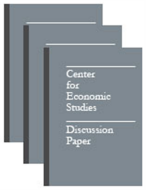Same-Sex and Opposite-Sex Couples and the Child Penalty
Same-Sex and Opposite-Sex Couples and the Child Penalty
Abstract
Existing work has shown that the entry of a child into a household results in a large and sustained increase in the earnings gap between male and female partners in opposite-sex couples. We expand this analysis of the child penalty to examine within-couple dynamics in earnings for both opposite-sex and same-sex couples in the U.S. around the time their first child enters the household. Using linked survey and administrative data and event-study methodology, we confirm earlier work finding a child penalty for women in opposite-sex couples. We find this is true even when the female partner is the primary earner pre-parenthood, lending support to the importance of gender norms in opposite-sex couples. By contrast, in both female and male same-sex couples, earnings changes associated with child entry differ by the relative pre-parenthood earnings of the partners and tend towards equalization: secondary earners see an increase in earnings, while primary earners see a small decrease.
Others in Series
Working Paper
Working Paper
Working Paper




